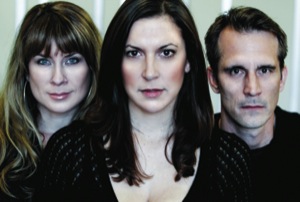
Sometimes, it’s refreshing to see a dramatic play that deals with contemporary issues, rather than a production buried in costumes that requires historical familiarity to be fully appreciated.
With a contemporary, topical production there’s at least a possibility, if not a probability, that you’ll already have an opinion about its underlying issues and the events portrayed. When combined with good writing, good acting and a tight production, the result is a show that features characters with whom an audience can identify.
On the other hand, who wants to turn away from today’s 24/7 news cycle in favor of escaping into a night of entertainment – only to spend a couple of hours listening to the same opinionating you’ve just left behind on a video monitor at home, and pay fifty bucks for the privilege?
Potential perils be damned, Obie Award-winning playwright Lisa Kron enters this territory with In the Wake, “an epic tale set in the turbulent years of 2000 to 2005”. This is Kron’s third play and it is now being presented at the San Diego REPertory Theatre (in the Lyceum Space) through March 4.
In the Wake evolves during the Bush years but it also unfolds in the personal life of its central protagonist Ellen (Aubrey Saverino), an intelligent and politically obsessed freelance writer living in New York with her boyfriend, whose close friends and family reside nearby. Much of the play is about Ellen’s insistence that her friends don’t realize how bad the domestic and geopolitical situations really are.
Ellen is 100 percent sure about everything: her ideals, her politics, even her friends. No one – not her adoring boyfriend Danny (Fran Gercke), her new lover Amy (Karson St. John), or her worldly wise and weary friend Judy (Stephanie Dunnam) can make Ellen see the blind spot at the center of her own politics and emotional life – that, of course being, (ahem) Amy.
The central ideas propelling In the Wake are encapsulated by some basic, existential questions: How can we (me the person, we the people) say that things are fine when they are not fine; how can we not see something that is blatantly obvious and influential in our lives; and, how can we be oblivious to the turbulence caused by our own actions, and the waves left in their wake as we plunge furiously toward our goals.
Kron points out the gap between who we think we are and how we actually behave. With In the Wake the playwright asks us individually and collectively to look for the blind spots that keep each of us from seeing ourselves with the benefit of a full-length mirror.
Unfortunately the play asks these questions in a very loud voice. The play shouts more than it speaks. Most of us stop listening when someone shouts their convictions even when we agree.
There is clearly a very smart, observant and left-leaning playwright behind this drama, and she is making a strong and compelling argument about self-denial, “group think,” and the historically recurring dilemma one might call “national blindness” to the crafty ways of the system.
But argument is the operative word. Clearly this play is about a strong-willed human being with a lot of opinions. It’s about someone who is frantic and earnest about making a better world. That is who she is and that is how she should be portrayed. But like that friend who is perhaps too vociferous about their convictions, the character of Ellen overwhelms, even when other complex characters are on stage with her. Frankly, I couldn’t help but wonder how Ellen could have such close friends and a romantic relationship (much less two of them) to boot.
A metaphor that is used effectively in the play, at its very heart, is in a scene where Ellen and her new lover Amy first meet. Flirting with Ellen like a famished predator, Amy describes a basic exercise in art that involves illustrating an object by drawing its negative space, for example drawing the space around Ellen’s hand, instead of the hand itself. By looking at and describing the air between Ellen’s fingers the artist sees her hand more clearly. What this rather lovely scene is saying (in other words) is that we are able to see and understand the full reality of a particular tree if we look at the forest around it. Yet, In the Wake contradicts this idea because it focuses on one mighty tree too insistently. I found it hard to see the forest for Ellen and therefore, within the frame of the artists’ exercise, did not see Ellen either. I needed more forest so that I could process – for that matter, breathe.
I wanted more of Danny, a gentle, peacemaking buffoon, whose comic relief was welcome. Laurie (Deanna Driscoll) is one half of a lesbian couple living in the same apartment building. I looked forward to the lighthearted chemistry between her and brother-in-law Danny. I also looked forward to both Laurie and friend Judy’s anchored, authentic advice. Ellen’s meeting with Amy came quickly and the evolution of their relationship arced fast. I wanted more of them too, as a quiet counterbalance if nothing else. Alas, these interludes were all too short.
In the Wake will entice you to recall and reconsider events that we have filed in forgotten folders behind “Obama,” “Recession” and “Arab Spring.” The play is also an appraisal of the Bush years from hanging chads to Katrina. It is also an LGBT tale throughout and to its core. In fact, a special ‘Out Night at the REP’ is scheduled with a performance of In the Wake Feb. 29.










